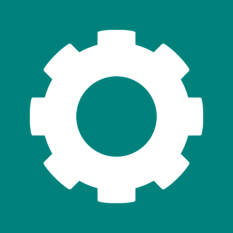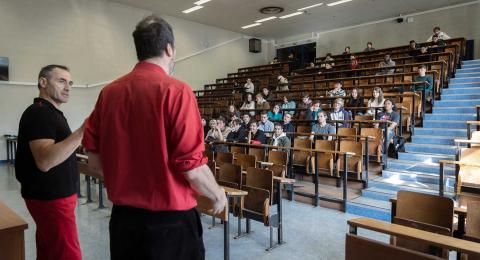The Master’s program in Advanced Industrial Systems Engineering trains engineers and managers capable of optimizing industrial performance, leading digital transformation, and driving innovation through cutting-edge technologies.
With its specialized tracks — TITaN (immersive technologies and AI), RSP (robotics and production systems), and MOMA (aeronautical maintenance) — it opens pathways to careers in smart industry (4.0 and beyond), as well as in research and development.
Smart industry, driven by immersive technologies, AI, IoT, robotics, and cobotics, is profoundly transforming processes (design, manufacturing, maintenance) as well as entire sectors (aeronautics, logistics, and more).
This Master’s program is structured around three majors:
- Immersive Technologies for Digital Transformation (TITaN)
- Robotics and Production Systems (RSP)
- Operations and Maintenance Management for Aeronautics (MOMA)
Combining theory and practice, the program places strong emphasis on hands-on experience through project-based learning and a 5- to 6-month internship in industry or in a research laboratory.
Information
Skills
Beyond scientific and technical knowledge, the ISIA Master’s program develops a set of key competencies that enable students to become major players in industrial transformation.
Through multidisciplinary courses, hands-on projects, and strong connections with both research and industry, graduates acquire not only high-level technical expertise but also skills in management, innovation, and communication.
These competencies make them versatile professionals, capable of evolving in complex and rapidly changing technological environments.
The program provides the opportunity to build skills in three main areas: technical, transversal & professional, and specialization-specific.
🔹 Technical skills
- Designing and optimizing complex industrial systems
- Exploiting and analyzing industrial data (data science)
- Leading the digital transformation of companies
- Developing innovative solutions for the industry of the future
- Conducting research and development projects
- Mastering methodological tools for experimentation and prototyping
🔹 Transversal and professional skills
- Leading multidisciplinary and international projects
- Working effectively in interdisciplinary teams
- Supporting organizational change
- Adapting to rapid technological evolution
- Building a strategic vision of industrial and socio-technical challenges
🔹 Specialization-specific skills (depending on the chosen track)
- Mastering robotics and integrating it into automated systems
- Mastering immersive technologies (VR, AR, MR), digital twins, and artificial intelligence
- Managing technical aspects of maintenance and production
- Optimizing industrial processes and quality outcomes
- Applying international standards, regulations, and safety requirements
Objectives
The Master’s in Advanced Industrial Systems Engineering (M2 ISIA) prepares future engineers and managers to tackle the major challenges of smart industry.
At the crossroads of electrical engineering, computer science, mechanical engineering, and industrial engineering, this program trains experts capable of leading digital transformation, optimizing industrial performance, and driving innovation in complex environments.
With its multidisciplinary approach and strong connections to both industry and research, ISIA opens up diverse career opportunities.
Students choose one of three specialized tracks, according to their career goals and professional aspirations:
🔹 TITaN – Immersive Technologies and Digital Transformation
This track immerses students in digital innovation, focusing on human-machine interaction, immersive technologies (VR, AR, MR), and artificial intelligence. Projects include the design of immersive simulators, digital twins, and virtual industrial environments. Graduates can pursue research (PhD) as well as fast-growing careers such as data scientist, virtual/augmented reality engineer, or immersive solutions designer.
🔹 RSP – Robotics and Production Systems
This track trains engineers capable of designing and integrating complex robotic systems for Industry 4.0. Combining theory and practice, students develop strong skills in robotics, intelligent systems, and human-robot interaction, enabling them to create practical solutions for the smart production lines of tomorrow.
🔹 MOMA – Maintenance and Operations Management for Aeronautics
Designed for students aiming to enter the rapidly evolving aeronautics sector, this track develops key competencies in maintenance management, process optimization, and production management. Its multidisciplinary approach covers the full life cycle of aircraft, while addressing stringent requirements in safety, security, and international regulations.
Career Opportunities
Career prospects
Chargé d'affaire
Chargé·e de projet
Chargé.e de recherche et innovation
Chargé·e de développement
Consultant·e
Consultant en transformation digitale
Ingénieur d’études dans les domaines de l’industrie
Ingénieur d’études dans les domaines de la recherche
ingénieur étude conception
Ingénieur de recherche ou d'études
Ingénieur.e recherche et développement
Responsable assurance qualité
Responsable de développement industriel
Responsable de systèmes d’information
Further Study Opportunities
Chargé·e de développement
Chargé·e d’études
Chercheur/chercheuse en R&D ou expert·e en modélisation et analyse de données dans des entreprises ou laboratoires de pointe.
Consultant·e
Data Scientist, Data Analyst, Ingénieur·e en Machine Learning dans des secteurs innovants (tech, finance, santé, énergie, etc.) ;
Doctorat
Ingénierie études, recherche et développement
Ingénierie méthodes et industrialisation
Thèse de doctorat
Fees and scholarships
The amounts may vary depending on the programme and your personal circumstances.
Capacity
Available Places
Target Audience and Entry Requirements
In general, the program is open to:
- Students enrolled in initial training, continuing education, or work-study programs.
- Students with a general scientific and technological background, or with a specialization in one of the major disciplines of Complex Systems Engineering and Industrial Engineering (production organization and management, quality management, computer engineering), having validated 60 ECTS credits at the Master’s level.
- Students who have successfully completed the second year of an engineering school in one of the above-mentioned fields.
- Any student whose prior education is deemed equivalent.
In all cases, applicants are expected to have:
- Scientific and technological knowledge at the Master’s Year 1 level (equivalent to four years of higher education, 240 ECTS) in Complex Systems Engineering.
- Proficiency in French and English.
Application Period(s)
From 02/02/2026 to 05/07/2026
Supporting documents
Compulsory supporting documents
Rank of previous year and size of the promotion.
Motivation letter.
All transcripts of the years / semesters validated since the high school diploma at the date of application.
Curriculum Vitae.
Additional supporting documents
Certificate of French (compulsory for non-French speakers).
VAP file (obligatory for all persons requesting a valuation of the assets to enter the diploma).









